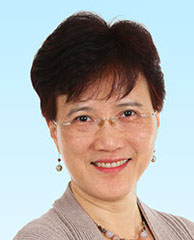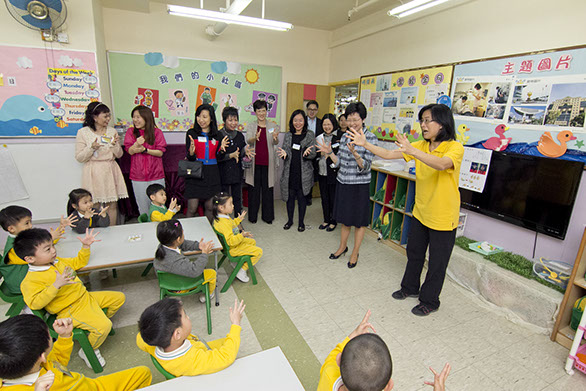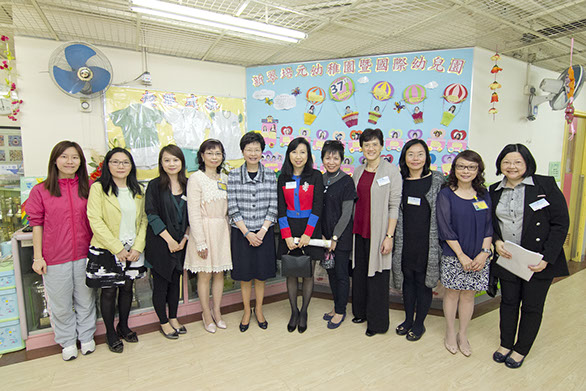Research shows that the earlier the intervention the better for children with special education needs (SEN), but lack of suitable services for pre-schoolers in Hong Kong, meant the waiting list for such intervention had grown to more than 6,000 in 2015.
“Parents were left in despair over what to do,” said Professor Lam Shui-fong of the Department of Psychology, who recognised the need and worked with the Heep Hong Society to overcome the problem. They developed a model to bridge the gap between intervention services and pre-schools. It has undergone two extensive trial programmes and is now being evaluated and pending approval is likely to be introduced as a government-funded service for all pre-schools across Hong Kong.
“Funded by the Lee Hysan Foundation, we tested the initial model in 10 kindergartens involving 60 children in 2014. The Government was so impressed that in late 2015 it extended the model to 450 kindergartens for a two-year pilot project with lottery funding – a move which has already cut the waiting list for such service in half to 3,000 children.
The Government’s interest has been encouraging. Mrs Carrie Lam, the then Chief Secretary of Administration, once attended a session at a kindergarten participating in the Lee Hysan project. “Several sets of parents of special needs children were there too,” said Professor Lam. “Some of them were in tears because of the frustration they felt at receiving so little government help for their children. Mrs Lam had a very positive response to the evaluation report within 90 minutes of reading it, and indicated that she would try to persuade her finance colleagues to allow the model to operate on a permanent basis in the future.”
The model they developed was created using the combined skills of and input from educational psychologists, speech therapists, occupational therapists, physiotherapists, special child-care workers, parents of special needs children and teachers. It adopts a two-pronged approach comprising both school-based support services and centre-based therapeutic training services. Individual Education Plans (IEP) for each child with SEN are devised, and special child care workers visit the kindergartens each month to coach teachers on-site on how to incorporate IEP objectives in day-to-day classroom learning, and to demonstrate skills in behavioural management and emotional regulation for children with SEN.
Educational psychologists and therapists also pay quarterly visits to the kindergartens to conduct classroom observation, curriculum consultation meetings to advise teachers on IEP implementation, activity design, and in-class learning support. In addition, teachers are invited to attend training workshops on strategies for teaching children with special education needs and how to identify such children in the first place. At the end of the school year, the professional team conducts evaluation meetings with teachers to review the progress of the children.
To ascertain the effectiveness of the initial model, a research team from HKU conducted a longitudinal study that tracked the development of the 60 children in the pioneering project from September, 2014 to August, 2015 alongside a control group. “We found marked improvements in the language skills, cognitive skills, motor skills and self-direction capability in the SEN children who had received the intervention,” said Professor Lam.
“The results have been gratifying as we set out to develop a model that would offer both school-based support and centre-based therapeutic services. Indeed the model encompasses all stakeholders in the equation – the children and their parents, the teachers, and therapists. One of the main priorities was improving the link between pre-schools and the intervention services. Additionally, the model ensures that specialists not only provide therapy for the children, but also train the parents at their centres, and the teachers in the classroom.
“Before, services were segmented: there was no dialogue between therapists and kindergarten teachers for example, and parents did not know how their children were being dealt with at pre-schools. We make sure the different elements meet. Some services are provided on-site at the kindergartens. It’s a System Model, which takes into account the environment and the ecology of the child’s situation, not merely a Remedial Model which focusses only on managing the issue.”

![]() Now, we have come up with the right model – the parents trust it, the
Now, we have come up with the right model – the parents trust it, the
kindergartens trust it and both the children and the teachers are empowered by it –
I feel we have accomplished something
very beneficial. ![]()
Professor Lam Shui-fong
The next step
The lottery funding allocated to the programme was for two years, ending this September, which dovetails with the change to Hong Kong’s education policy to extend free schooling to include kindergarten services.
Accordingly, the pilot programme is currently being evaluated by Dr Anna Hui from the City University of Hong Kong. “We hope by September to have the go ahead,” said Professor Lam. “If it gets approval the Government wants to make the model a permanent service, and will fund it themselves so the service will no longer need to rely on the lottery fund.
“If it is introduced, this will have a big impact, providing permanent support for special needs pre-schoolers. I have been at HKU for 20 years, and in all the work I have done, this is the most gratifying to me and will accomplish the most. Those parents’ tears affected me too. They were in despair and felt they had nowhere to turn. Now, we have come up with the right model – the parents trust it, the kindergartens trust it and both the children and the teachers are empowered by it – I feel we have accomplished something very beneficial.”

Meeting Everyone’s Need
In September this year, the Hong Kong Government will extend free schooling from 12 years to 15, including three years of pre-school. Scholars at HKU used this as their deadline for putting into place a programme of special needs services for pre-schoolers.
Mrs Carrie Lam (second from right) joining the kids in finger play, an exercise that trains fine motor skills. This play is enjoyed by all kids disregarding special education needs.
Mrs Carrie Lam (fifth from left) and Professor Lam Shui-fong (fourth from right) visiting New Jade Elementi Kindergarten, one of the pre-schools that participated in the Lee Hysan project, and meeting with the Principal, teachers, therapists, social workers, and the educational psychologist.
Next
Back




